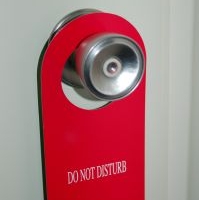Interruptions: Mostly Negative But Sometimes Positive

I’m puzzled by the claim I’ve often seen that it takes fifteen minutes to recover from every interruption. When I’ve tested this for myself, my recovery time is closer to several seconds than fifteen minutes—or maybe I’m deceiving myself. Still, given all the interruptions in a typical workday, if it actually takes fifteen minutes to recover from every interruption, nothing would ever be accomplished. But even with a brief recovery time, even a handful of small interruptions is all it would take to divert you from achieving your goals.
Interruptions are more than just a distraction. According to recent research findings, unscheduled interruptions at work leave people more exhausted and more prone to making errors. Interestingly, the most common disruptions come not from online temptations but from coworkers. We have the option to defer or ignore online distractions (at least in theory), but it’s hard to ignore a coworker who barges into your cubicle. Even a two-second interruption is enough to cause you to lose your thread and make errors when you resume your work.
Making matters worse, the open-plan offices that have become so popular make communication easier, which therefore facilitates interruptions. If you want to avoid interruptions at work, you may need to do as Dilbert does and work when no one is around.
But before we’re too quick to blame others, it bears mentioning that we are also self-interrupters extraordinaire because task switching is a major form of interruption. A study in which observers shadowed information workers in high-tech companies found that people switched activities between tasks and between entire projects every three minutes and five seconds, on average.
Of course, it’s also thanks to the Internet that we’re often the cause of our own interruptions. Nicholas Carr, author ofThe Shallows: What the Internet Is Doing to Our Brains, has described the Internet as an interruption system that seizes our attention and then scrambles it. Numerous studies by psychologists, neurobiologists, and educators have found that the web promotes cursory reading, hurried and distracted thinking, and superficial learning. The web may actually be changing the structures of our brains.
Still, it would be a mistake to consider all interruptions negative. If an interruption relates to the task you’re working on, it may help you better accomplish that task or avoid a problem you might otherwise have encountered. Furthermore, when you get stuck trying to solve a problem, taking a break and letting the problem incubate can sometimes help. And an occasional timeout to take a walk, meditate, or just take a mental break may let you return to the job more focused and energized.
How do you cope with interruptions in your workplace?

